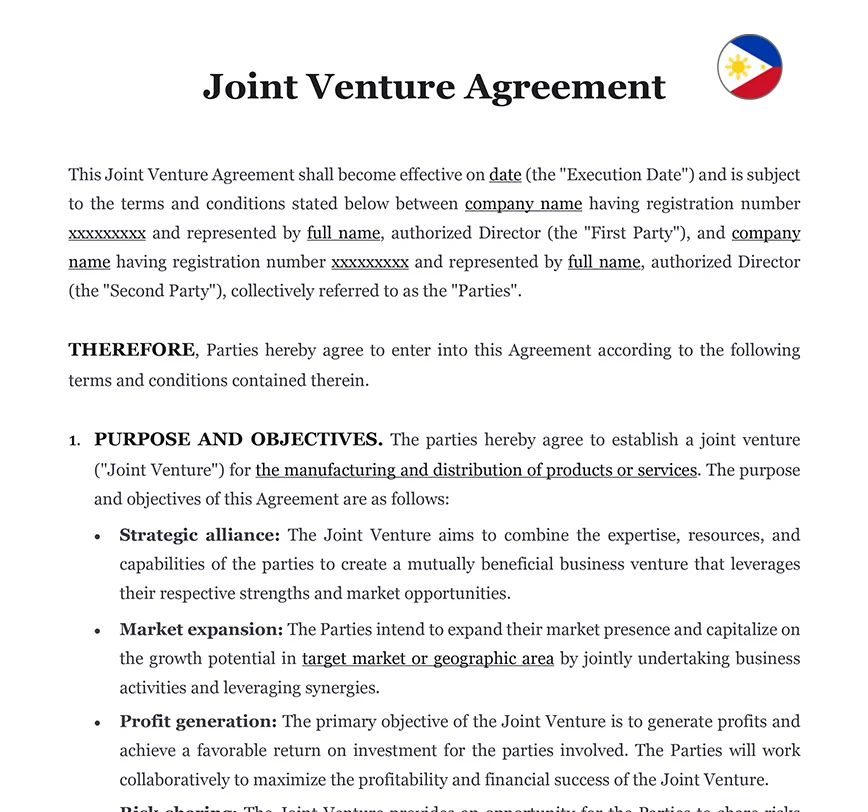Ready to use legal template
Drafted by experienced lawyers
Compliant with Filipino law
Ready to use legal template
Drafted by lawyers
Compliant with Filipino law
Home › Business contracts › Joint Venture Agreement
Learn more about Joint Venture Agreement in Philippines
Utilizing a joint venture agreement in the Philippines presents an exceptional marketing opportunity for businesses seeking to leverage local expertise, resources, and market knowledge. By entering into a strategic partnership with a local company, businesses can combine their strengths and create a powerful market presence. A joint venture agreement serves as a catalyst for collaboration, allowing businesses to tap into the partner’s established customer base, distribution channels, and brand reputation. This collaboration enables businesses to unlock new market segments, introduce innovative products or services, and amplify their marketing efforts.
Table of contents
-
-
What is a Joint Venture Agreement in the Philippines?
-
Why consider a Joint Venture Agreement for business ventures?
-
What should include a Joint Venture Agreement?
-
What are the legal requirements for Joint Venture Agreements?
-
How can you choose the right partner for a Joint Venture Agreement?
-
What strategies to negotiate a successful Joint Venture?
-
What financial and operational factors should be taken into account?
-
What is a Joint Venture Agreement in the Philippines?
A Joint Venture Agreement in the Philippines is a legal contract that establishes the terms and conditions of a collaborative business venture between two or more parties. It outlines the rights, responsibilities, and obligations of each party involved in the joint venture. The agreement serves as a blueprint for the partnership, covering aspects such as profit sharing, decision-making authority, risk allocation, and dispute resolution.
Why consider a Joint Venture Agreement for business ventures in the Philippines?
A Joint Venture Agreement is worth considering for business ventures in the Philippines for several reasons. Firstly, it allows companies to combine their resources, expertise, and networks, leading to increased market reach and competitive advantage. By pooling their strengths, companies can access new markets, share costs and risks, and capitalize on synergies.
Secondly, a Joint Venture Agreement provides a legal framework for cooperation and clearly defines the rights and obligations of each party. This helps in mitigating conflicts, managing expectations, and promoting a harmonious working relationship between the joint venture partners.
Furthermore, a Joint Venture Agreement enables companies to tap into the local knowledge, market insights, and connections of their partners in the Philippines. This can be particularly advantageous when entering a foreign market, as local partners can navigate regulatory requirements, cultural nuances, and business practices, facilitating smoother operations and market entry.
What should include a Joint Venture Agreement?
A comprehensive Joint Venture Agreement should include key components to ensure clarity and protection for all parties involved. These components typically include:
1. Identification of the parties
Clearly state the names, addresses, and roles of each joint venture partner.
2. Purpose and scope
Define the specific objectives and scope of the joint venture, including the products, services, or projects to be undertaken.
3. Contributions
Outline the contributions of each partner, including financial investments, assets, intellectual property, or other resources.
4. Management and decision-making
Establish the decision-making process, responsibilities, and authority of each partner in managing the joint venture.
5. Profit sharing and distribution
Define how profits and losses will be shared among the partners, including the allocation of dividends and reinvestment of profits.
6. Intellectual property rights
Address the ownership, use, and protection of intellectual property created or used within the joint venture.
7. Term and termination
Specify the duration of the joint venture and the conditions under which it can be terminated or extended.
8. Dispute resolution
Establish mechanisms for resolving conflicts or disputes that may arise during the course of the joint venture.
What are the legal requirements for Joint Venture Agreements in the Philippines?
In the Philippines, Joint Venture Agreements are subject to legal requirements. While the specific legal framework may vary depending on the nature of the joint venture and the industries involved, there are some general considerations. It is advisable to consult with legal professionals to ensure compliance with applicable laws and regulations. Some key legal requirements for Joint Venture Agreements in the Philippines may include:
1. Compliance with Philippine Corporation Code or other relevant laws governing business entities.
2. Registration and licensing requirements, such as securing necessary permits or approvals from regulatory authorities.
3. Adherence to competition laws and regulations to ensure the joint venture does not violate antitrust or anti-competition provisions.
4. Compliance with tax laws, including company registration, reporting, and payment of taxes applicable to the joint venture.
5. Protection of intellectual property rights by registering trademarks, patents, or copyrights, if applicable.
6. Compliance with labor laws and regulations regarding employment contracts, benefits, and obligations to employees.
How can you choose the right partner for a Joint Venture Agreement?
Choosing the right partner for a Joint Venture Agreement is crucial for the success of the collaboration. Consider factors such as the partner’s expertise, reputation, financial stability, cultural compatibility, and shared vision and goals. Conduct thorough due diligence, including background checks, financial analysis, and assessment of past performance. Evaluate their track record, industry experience, market knowledge, and existing networks. It is essential to establish open and transparent communication, trust, and a mutual understanding of roles and expectations.
What strategies can be employed to negotiate a successful Joint Venture?
Negotiating a successful Joint Venture requires effective strategies. Start by conducting thorough research on the potential partner and the market. Clearly define your objectives and desired outcomes and communicate them effectively during negotiations. Seek win-win solutions that address the interests of both parties. Maintain flexibility while setting boundaries to protect your interests. Establish a collaborative and respectful relationship, focusing on open communication and active listening. Engage lawyers with expertise in negotiation and legal matters to guide you through the process and ensure a fair and favorable agreement.
What financial and operational factors should be taken into account?
When entering into a joint venture, it is crucial to consider various financial factors to ensure the success and viability of the partnership. Here are some key financial aspects to take into account:
| ➤ Capital contributions: Determine the required capital contributions from each party involved in the joint venture. Clearly define the financial responsibilities and obligations of each party, including the initial investment, ongoing funding, and profit-sharing arrangements. |
| ➤ Financial projections: Develop comprehensive financial projections that outline the expected revenues, expenses, and profitability of the joint venture. Conduct a thorough analysis of the market, industry trends, and potential risks to create realistic financial forecasts. |
| ➤ Risk allocation: Assess and allocate financial risks between the parties involved in the joint venture. Clearly define how financial losses, liabilities, and obligations will be shared. Establish mechanisms for addressing unforeseen financial challenges or disputes that may arise during the partnership. |
| ➤ Exit strategies: Plan for the possibility of exiting the joint venture and address the financial implications associated with such scenarios. Determine the terms and conditions for exiting the partnership, including the valuation and transfer of assets, rights, and liabilities. |
| ➤ Financial reporting and transparency: Establish clear guidelines for financial reporting and transparency within the joint venture. Implement robust financial control systems, reporting mechanisms, and auditing processes to ensure accurate financial information is shared among the parties. |
| ➤ Tax considerations: Understand the tax implications of the joint venture structure and operations. Seek advice from tax experts to optimize tax planning strategies and ensure compliance with relevant tax laws and regulations in the Philippines. |
| ➤ Funding sources: Evaluate the availability of funding sources for the joint venture. Consider the potential need for additional financing, such as loans, equity investments, or grants, and explore options for securing such funding. |
| ➤ Financial management: Establish mechanisms for financial management and decision-making within the joint venture. Determine the roles and responsibilities of each party in financial matters and establish clear protocols for budgeting, financial controls, and financial decision-making processes. |




